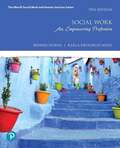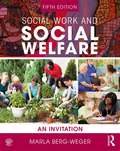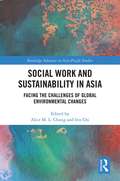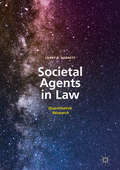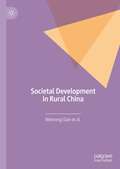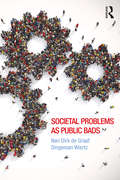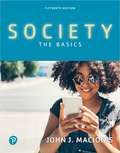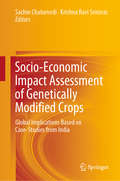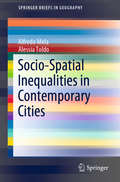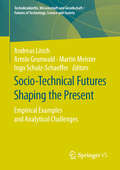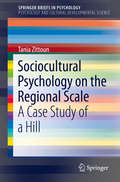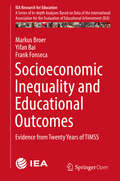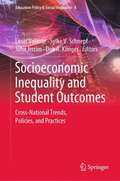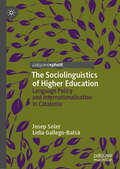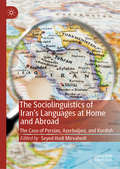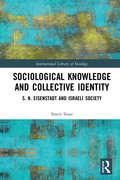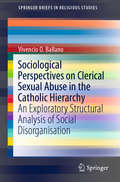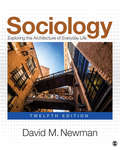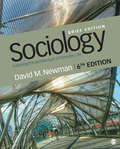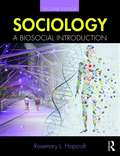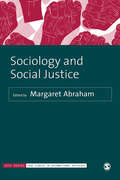- Table View
- List View
Social Work: An Empowering Profession
by Brenda Dubois Karla MileyWith its strengths and empowerment approach, Social Work: An Empowering Profession, 7 explores contemporary themes such as diversity and social justice and integrates the Council on Social Work Education's core competencies throughout. Each chapter reflects and integrates the core competencies in the 2008 Educational Policy and Accreditation Standards (EPAS) set by the Council on Social Work Education (CSWE). End-of-chapter assessment reinforces this integration, and MySocialWorkLab.com activities support the mastery of CSWE's core competencies.
Social Work and Social Welfare: An Invitation
by Marla Berg-WegerSocial Work and Social Welfare: An Invitation is a best-selling text and website for introduction to social work courses. It provides students with the knowledge, skills, and values that are essential for working with individuals, families, groups, organizations, communities, and public policy in a variety of practice settings. The fifth edition of Social Work and Social Welfare is in full color, with more visuals and photos throughout. As with previous editions, this book is an up-to-date profile of the world in which today’s social workers practice, with current demographic, statistical, legislative, policy, and research information; and sensitive discussions of contemporary ethical issues. The text includes exercises from six interactive cases.Visit www.routledgesw.com for the detailed cases and companion materials that teach students about social work through practice. In this book and companion custom website you will find: ■■ An emphasis on a strengths-based perspective and attention to diversity, social environment, theory and theoretical frameworks, levels of social work practice, and an array of fields of practice. ■■ The histories of social welfare and the social work profession presented as the intertwined phenomena that they are. ■■ A profile of the contemporary landscape of the society in which social workers practice. ■■ Social work practice within the framework of planned change, encompassing: engagement, assessment, intervention, and evaluation and termination. ■■ The opportunity to hear from social work practitioners working in fourteen diverse and challenging practice settings. ■■ Six unique, in-depth, interactive, easy-to-access cases that students can easily reach from any computer, provide a “learning by doing” format unavailable with any other text(s). Students will have an advantage unlike any other they will experience in their social work training. ■■ A wealth of instructor-only resources provide: full-text readings that link to the concepts presented in each of the chapters; a complete bank of objective and essay-type test items, all linked to current CSWE EPAS standards; PowerPoint presentations to help students master key concepts; annotated links to a treasure trove of social work assets on the internet; and a forum inviting all instructors using texts in the series to communicate with each other, and share ideas to improve teaching and learning.
Social Work and Sustainability in Asia: Facing the Challenges of Global Environmental Changes (Routledge Advances in Asia-Pacific Studies)
by Alice Chong Iris ChiThe rapid trend of globalization has brought with it a variety of sustainability challenges, including global climate change, biodiversity loss, poverty, and social inequalities, which are problems with unclear boundaries, complicated interrelated components, undefined parameters, contradictory values, and no single solution. Social work has a long-standing tradition of emphasizing the interaction of people and their environment. For this reason, the field of social work is one of the best-placed academic disciplines for studying the impact of environmental change on social systems, and should play an important role in developing strategies for mitigating and adapting to these environmental challenges. However, traditional social work tends to lack sustaining work and neglect globally interconnected social problems. Combining case studies and country reports from around Asia with a theoretical framework for understanding sustainability concerns, this book aims to show how social work can play a valuable role in mitigating and adapting to environmental challenges and social sustainability. For social work to develop a meaningful and viable profession that addresses contemporary sustainability issues, it requires changes and transformation in paradigm, theories, strategies, social policy and social services that will facilitate a sustainable future for all mankind.
Societal Agents in Law: Quantitative Research
by Larry D. BarnettIn this two-volume set, Larry D. Barnett delves into the macrosociological sources of law concerned with society-important social activities in a structurally complex, democratically governed nation. Barnett explores why, when, and where particular proscriptions and prescriptions of law on key social activities arise, persist, and change. The first volume, Societal Agents in Law: A Macrosociological Approach, puts relevant doctrines of law into a macrosociological framework, uses the findings of quantitative research to formulate theorems that identify the impact of several society-level agents on doctrines of law, and takes the reader through a number of case analyses. The second volume, Societal Agents in Law: Quantitative Research, reports original multivariate statistical studies of sociological determinants of law on specific types of key social activities. Taken together, the two volumes offer an alternative to the almost-total monopoly of theory and descriptive scholarship in the macrosociology of law, comparative law, and history of law, and underscore the value of a mixed empirical/theoretical approach.
Societal Development in Rural China
by Wenrong QianThis book provides a broad survey of Chinese rural households, examining ongoing changes in Chinese society and economy through the lens of the situation of rural families in China. Based on data from Zhejiang University’s China Rural Household Panel Survey (CRHPS) in 2015 on rural households, which analyses all aspects of grass-roots rural households in China, this volume offers a scientific analysis of social development in rural China, exploring notably the basic structure, employment situation, income and expenditure, social security, and education situation of Chinese rural households, as well as the governance and public services of rural communities.
Societal Problems as Public Bads
by Nan Dirk de Graaf Dingeman WiertzCorruption, crime, economic inequality, religious fundamentalism, financial crises, environmental degradation, population ageing, gender inequality, large-scale migration… This book tackles many of the most pressing problems facing societies today. The authors demonstrate that similar social mechanisms lie behind many of these seemingly disparate problems. Indeed, many societal problems can be traced back to behaviours that are perfectly rational and often well-intended from an individual perspective. Yet, taken together these behaviours can – paradoxically – give rise to unintended and undesirable outcomes at the society level. In addition to addressing the causes of societal problems, the book explains why some problems rank higher on the public agenda than others. Moreover, it is shown how government intervention may sometimes provide a cure, yet other times exacerbate existing problems or create new problems of its own. This book includes an extensive amount of data on trends and geographic variation in the prevalence of different problems, as well as telling examples – both recent and historical – from a variety of countries to support its key arguments. Employing a bold multidisciplinary approach, the authors draw on insights from across the social sciences, including sociology, economics, anthropology, criminology, and psychology. Throughout the book, students are introduced to analytical concepts such as free-riding, herding behaviour, principal-agent relations and moral hazard. These concepts are essential tools for better understanding the roots of many societal problems that regularly make headlines in the news. This improved understanding will, in turn, be critical for ultimately finding solutions to these problems.
Society: The Basics
by David Myers Jean TwengeConnecting Social Psychology to the world around us. Social Psychology introduces students to the science of us: our thoughts, feelings, and behaviors in a changing world. Students learn to think critically about everyday behaviors and gain an appreciation for the world around us, regardless of background or major. In this edition, esteemed author David Myers is again joined by respected psychology professor and generational differences researcher Jean Twenge, in presenting an integrated learning program designed for today's students.
Society the Basics
by John J. MacionisSociety: The Basics, Fifteenth Edition, provides you with comprehensive understanding of how this world works. You will find this title informative, engaging, and even entertaining. Before you have finished the first chapter, you will dis-cover that sociology is both enlightening and useful, and it is also a great deal of fun. Sociology is a field of study that can change the way you see the world and open the door to many new opportunities. What could be more exciting than that?
Socio-Economic Impact Assessment of Genetically Modified Crops: Global Implications Based on Case-Studies from India
by Sachin Chaturvedi Krishna Ravi SrinivasThis book provides a comprehensive overview of socio-economic impact assessments for genetically modified organisms, including genetically modified crops. It features case studies involving Bt cotton and other selected crops with improved traits from six major institutions in India and combines field data with surveys on stakeholder perceptions. It also discusses global trends in the socio-economic assessment of GMOs and reviews the available literature on the economic assessment of GM crops and how various countries have implemented Article 26.1 of the Cartagena Protocol on Biosafety. Further, it explores cost–benefit analyses and sociological aspects of socio-economic assessments.Based on this, the book proposes a framework and offers guidelines for socio-economic assessment that can be adapted for various GM crops. Lastly, it examines the relevance of socio-economic impact assessment in light of new applications such as GM mosquitoes and gene drives. Given its scope, the book is of interest to all academics, policymakers, regulators, and general readers concerned about the broader impacts of GM crops and applications like gene drives.
Socio-Spatial Inequalities in Contemporary Cities (SpringerBriefs in Geography)
by Alfredo Mela Alessia ToldoThe book explores social inclusion/exclusion from a socio-spatial perspective, highlighting the active role that space assumes in shaping social phenomena. Unlike similar books, it does not discuss exclusion and inclusion in particular geographical contexts, but instead explains these phenomena starting from the dense and complex set of relationships that links society and space. It particularly focuses on social differences and how the processes of exclusion and inclusion can produce a highly spatialized understanding of them, for example when particular groups of people are perceived as being out of place.At the same time, within the context of the different approaches that policies adopt to contrast the phenomena of social exclusion, it examines the role of participation as an instrument to promote bottom-up inclusion and cohesion processes.
Socio-Technical Futures Shaping the Present: Empirical Examples and Analytical Challenges (Technikzukünfte, Wissenschaft und Gesellschaft / Futures of Technology, Science and Society)
by Andreas Lösch Armin Grunwald Martin Meister Ingo Schulz-SchaefferThe exploration of ways to conceptualize the shaping of the present by socio‐technical futures is the aim of this volume. Therefore it brings together contributions from Science and Technology Studies and Technology Assessment, which focus all on the question how socio-technical images of the future shape present processes of innovation and transformation starting from empirical case studies and generalizing specific findings or by tackling conceptual questions from the outset. A white paper of 23 authors, which aims to sensitize researchers and practitioners completes the volume.
Sociocultural Psychology on the Regional Scale: A Case Study of a Hill (SpringerBriefs in Psychology)
by Tania ZittounThis brief presents the case study of a hill in Czech Republic (Říp) and its region, and contributes to theorization in sociocultural psychology on three points, along three current debates. First, it contributes to the exploration of the mutual constitution of the lifecourse and of history, uses a distinction between socio-, micro- and ontogenesis, and argues that a focus on a delimited geographical space enables to better observe the processes by which history, daily situated interactions and courses of life shape each other. Second, in doing so, it sketches an understanding of the role of the material, spatial and semiotic specificities of landscapes in human development. Especially, it identifies some of the processes by which redundant dynamic patterns present in the environment may participate to the guidance of human experience. Third, it expands the reflection on case study construction and generalization. On the one side, it participates to a current debate in cultural psychology on the dynamics of generalization from single cases; on the other, it also dialogues with a more general reflection in the social sciences on social dynamics at the scale of small regions. Altogether, this brief is a first attempt to examine jointly these questions at the scale of a small region, a unique natural laboratory of social and psychological change. It will be of interest to researchers as well as graduate students in the fields of cultural and sociocultural psychology, cognitive psychology, and the social sciences.
Socioeconomic Inequality and Educational Outcomes: Evidence from Twenty Years of TIMSS (IEA Research for Education #5)
by Markus Broer Yifan Bai Frank FonsecaThis open access book focuses on trends in educational inequality using twenty years of grade 8 student data collected from 13 education systems by the IEA’s Trends in Mathematics and Science Study (TIMSS) between 1995 and 2015. While the overall positive association between family socioeconomic status (SES) and student achievement is well documented in the literature, the magnitude of this relationship is contingent on social contexts and is expected to vary by education system. Research on how such associations differ across societies and how the strength of these relationships has changed over time is limited. This study, therefore, addresses an important research and policy question by examining changes in the inequality of educational outcomes due to SES over this 20-year period, and also examines the extent to which the performance of students from disadvantaged backgrounds has improved over time in each education system. Education systems generally aim to narrow the achievement gap between low- and high-SES students and to improve the performance of disadvantaged students. However, the lack of quantifiable and comprehensible measures makes it difficult to assess and monitor the effect of such efforts. In this study, a novel measure of SES that is consistent across all TIMSS cycles allows students to be categorized into different socioeconomic groups. This measure of SES may also contribute to future research using TIMSS trend data. Readers will gain new insight into how educational inequality has changed in the education systems studied and how such change may relate to the more complex picture of macroeconomic changes in those societies.
Socioeconomic Inequality and Student Outcomes: Cross-National Trends, Policies, and Practices (Education Policy & Social Inequality #4)
by Louis Volante Sylke V. Schnepf John Jerrim Don A. KlingerThis book examines socioeconomic inequality and student outcomes across various Western industrialized nations and the varying success they have had in addressing achievement gaps in lower socioeconomic status student populations. It presents the national profiles of countries with notable achievement gaps within the respective school-aged student populations, explains the trajectory of achievement results in relation to both national and international large-scale assessment measures, and discusses how relevant education policies have evolved within their national contexts. Most importantly, the national profiles investigate the effectiveness of policy responses that have been adopted to close the achievement gap in lower socioeconomic status student populations. This book provides a cross-national analysis of policy approaches designed to address socioeconomic inequality.
The Sociolinguistics of Higher Education: Language Policy and Internationalisation in Catalonia
by Josep Soler Lídia Gallego-BalsàThis book investigates the sociolinguistic dimension of the internationalisation of higher education, examining the linguistic tensions and ambiguities experienced by universities around the world, particularly in non-anglophone contexts. Joining current debates within discursive and ethnographic approaches to language policy, the authors analyse the narrative emerging from university language policy documents, and then trace the stance-taking processes of different stakeholders at a small university in Catalonia. They pay particular attention to how teachers, administrative staff, and exchange students position themselves in connection to the role of Catalan and its coexistence with other languages at the university. This book will be of interest to language policy scholars and practitioners, as well as graduate students in sociolinguistics and applied linguistics
The Sociolinguistics of Iran’s Languages at Home and Abroad: The Case of Persian, Azerbaijani, and Kurdish
by Seyed Hadi MirvahediThis book examines the sociolinguistics of some of Iran’s languages at home and in the diaspora. The first part of the book examines the politics of minority languages and the presence of hegemonic discourses which favour Persian (Farsi) in Iran, exploring issues such as language maintenance and shift, linguistic ideologies and practices among Azerbaijani and Kurdish-speaking communities. The authors then go on to examine Iranians’ linguistic ideologies, practices and (trans)national identity construction in the diaspora, investigating both the challenges of maintaining a home language and the strategies and linguistic repertoires employed when constructing a diasporic identity away from home. This book will be of interest to students and scholars of minority languages and communities, diaspora and migration studies, and language policy and planning.
Sociological Knowledge and Collective Identity: S. N. Eisenstadt and Israeli Society (International Library of Sociology)
by Stavit SinaiSociology, emerging in the 19th century as the study of national societies, is the intellectual product of its time, power relations and social imaginaries. As a discursive practice that was enmeshed in the meta-narratives of modernity, the discipline of sociology bears the inherent capacity to shape socially shared concepts and construct collective identities. This book examines the relationships between sociology and projects of national identity construction, and presents a critique of Shmuel N. Eisenstadt, the prominent Israeli sociologist known as the "father of Israeli sociology". The book focuses on Eisenstadt’s sociology of Israel as a case of knowledge construction within an ideological system and examines the relationships between his various sociological analyses of Israeli society and the Zionist imaginary, namely the deeply entrenched political myths and historiographical narratives that constitute Israel’s hegemonic national identity. By emphasizing the interrelation between textuality, identity, and loaded language, the volume seeks to demythologize Eisenstadt’s sociology of Israel. Three major concepts in Eisenstadt’s scholarship are specifically thematized: integration, civilization, and modernities. In each of these foci, the author shows how Eisenstadt’s sociological conjectures reproduce dominant Zionist historiographical representations of the past, rationalize prevalent social hierarchies, reify the boundaries of a national collective "Self", and render legitimacy to Israel’s governing ethnocratic tendencies, underlying the premises of the Zionist settler-colonial project. Sociological Knowledge and Collective Identity will appeal to those interested in the interconnectedness of sociology and political memory, as well as in a radical postcolonial reconstruction of sociology.
Sociological Perspectives on Clerical Sexual Abuse in the Catholic Hierarchy: An Exploratory Structural Analysis of Social Disorganisation (SpringerBriefs in Religious Studies)
by Vivencio O. BallanoThis book, as an exploratory sociological analysis, broadly examines the major structural factors which contribute to the social disorganization of the Catholic hierarchy as a clerical community, facilitating the persistence of clerical sexual abuse in the Catholic Church. Using some tenets of the social disorganization theory on crime and deviance as the overall theoretical framework with some perspectives from social organization, social network, and social capital, and secondary literature and qualitative data to support the arguments, it examines the (1) diocesan clergy’s social interaction, mutual support, and social control system in the hierarchical community, (2) connection between mandated clerical celibacy and clerical sexual abuse, and (3) the implication of the laity’s lack of empowerment and ecclesiastical authority to monitor and sanction clerical behavior. The Catholic hierarchy prides itself as a unified community of clerics under the Pope who shares the one priesthood of Christ. But the current clerical sexual scandals and the inability of bishops to adequately manage clerical sexual abuse cases make one wonders whether the Catholic clergy is indeed a cohesive and socially organized community which inhibits clerical sexual abuse. This book invites Church authorities, theologians, scholars, and lay leaders to understand the persistent clerical sexual abuse empirically and to come up with structural reforms which enhance the social network and social control systems of the Catholic hierarchy against clerical sexual misconduct and support victims.
Sociology: Exploring the Architecture of Everyday Life
by Dr David M. NewmanIn Sociology: Exploring the Architecture of Everyday Life, David M. Newman shows students how to see the "unfamiliar in the familiar"—to step back and see organization and predictability in their take-for-granted personal experiences. With his approachable writing style and lively personal anecdotes, the author's goal from the first edition has always been the same: to write a textbook that, in his words, "reads like a real book." Newman uses the metaphors of "architecture" and "construction," to help students understand that society is not something that just exists "out there," independently of themselves; it is a human creation that is planned, maintained, or altered by individuals. Using vivid prose, examples from current events, and the latest research findings, this fully updated Twelfth Edition presents a unique and thought-provoking overview of how society is constructed and experienced. Instead of surveying every subfield in sociology, the more streamlined coverage focuses on the individual and society, the construction of self and society, and social inequality in the context of social structures.
Sociology: Exploring the Architecture of Everyday Life
by Dr David M. NewmanIn Sociology: Exploring the Architecture of Everyday Life, David M. Newman shows students how to see the "unfamiliar in the familiar"—to step back and see organization and predictability in their take-for-granted personal experiences. With his approachable writing style and lively personal anecdotes, the author's goal from the first edition has always been the same: to write a textbook that, in his words, "reads like a real book." Newman uses the metaphors of "architecture" and "construction," to help students understand that society is not something that just exists "out there," independently of themselves; it is a human creation that is planned, maintained, or altered by individuals. Using vivid prose, examples from current events, and the latest research findings, this fully updated Twelfth Edition presents a unique and thought-provoking overview of how society is constructed and experienced. Instead of surveying every subfield in sociology, the more streamlined coverage focuses on the individual and society, the construction of self and society, and social inequality in the context of social structures.
Sociology: Exploring the Architecture of Everyday Life, Brief Edition
by Dr David M. NewmanThis new Brief Sixth Edition of David Newman’s text is the streamlined version of Sociology: Exploring the Architecture of Everyday Life with the same goal: to be a textbook that, in the author’s words, "reads like a real book." Newman shows to see the “unfamiliar in the familiar”—to step back and see organization and predictability in their take-for-granted personal experiences. Newman uses the metaphors of “architecture” and “construction,” to help students understand that society is not something that exists “out there,” independently of themselves; it is a human creation that is planned, maintained, or altered by individuals. Instead of surveying every subfield in sociology, this text focuses on the structural features of society, the social construction of self and identity, and social inequality in the context of social institutions. The new edition includes examples and analysis of contemporary events and trends, including: The changes in our national politics brought about by the 2016 presidential election Increasing societal attention paid to fatal encounters between police and unarmed people of color or incidents of sexual harassment and assault School shootings and the debates over gun ownership The continued dramatic growth of communication technology, particularly social networking sites
Sociology: Exploring the Architecture of Everyday Life, Brief Edition
by Dr David M. NewmanThis new Brief Sixth Edition of David Newman’s text is the streamlined version of Sociology: Exploring the Architecture of Everyday Life with the same goal: to be a textbook that, in the author’s words, "reads like a real book." Newman shows to see the “unfamiliar in the familiar”—to step back and see organization and predictability in their take-for-granted personal experiences. Newman uses the metaphors of “architecture” and “construction,” to help students understand that society is not something that exists “out there,” independently of themselves; it is a human creation that is planned, maintained, or altered by individuals. Instead of surveying every subfield in sociology, this text focuses on the structural features of society, the social construction of self and identity, and social inequality in the context of social institutions. The new edition includes examples and analysis of contemporary events and trends, including: The changes in our national politics brought about by the 2016 presidential election Increasing societal attention paid to fatal encounters between police and unarmed people of color or incidents of sexual harassment and assault School shootings and the debates over gun ownership The continued dramatic growth of communication technology, particularly social networking sites
Sociology: A Biosocial Introduction
by Rosemary L. HopcroftIn an era of human genome research, environmental challenges, new reproductive technologies, and more, students can benefit from introductory sociology text that is biologically informed. This innovative text integrates mainstream sociological research in all areas of sociology with a scientifically informed model of an evolved, biological human actor. This text allows students to better understand their emotional, social, and institutional worlds. It also illustrates how biological understanding naturally enhances the sociological approach. This grounding of sociology in a biosocial conception of the individual actor is coupled with a comparative approach, as human biology is universal and often reveals itself as variations on themes across human cultures. Tables, figures, and photos, and the author’s concise and remarkably lively style make this a truly enjoyable book to read and teach.
Sociology and Social Justice: Toward A More Just World (SAGE Studies in International Sociology)
by Margaret Abraham"Superbly conceptualises and contextualises social justice in and for our global age. The stellar cast of sociologists connect concepts to practices and outline the challenges we face, as well as providing necessary responses." Gurminder K Bhambra, Professor of Postcolonial and Decolonial Studies, University of Sussex" A collection of brilliant essays by international scholar-activists, examining concepts and practices from diverse contexts." Mary Romero, Professor of Justice Studies and Social Inquiry, Arizona State University "An excellent set of chapters bringing to the fore new perspectives on the social injustices and inequalities facing a world in crisis." Kammila Naidoo, Professor of Sociology, University of Johannesburg By using contextual global sociology, Sociology and Social Justice explores: Historic and contemporary sites and contexts around the world Sociological insights on topics ranging from social movements, to cyber space. International struggles, processes, and outcomes Written by distinguished international scholars, this is an essential text for those looking at issues of: Human Rights, Public Sociology, Democratization, Gender, and Globalization.
Sociology and Social Justice: Toward A More Just World (SAGE Studies in International Sociology)
by Margaret Abraham"Superbly conceptualises and contextualises social justice in and for our global age. The stellar cast of sociologists connect concepts to practices and outline the challenges we face, as well as providing necessary responses." Gurminder K Bhambra, Professor of Postcolonial and Decolonial Studies, University of Sussex" A collection of brilliant essays by international scholar-activists, examining concepts and practices from diverse contexts." Mary Romero, Professor of Justice Studies and Social Inquiry, Arizona State University "An excellent set of chapters bringing to the fore new perspectives on the social injustices and inequalities facing a world in crisis." Kammila Naidoo, Professor of Sociology, University of Johannesburg By using contextual global sociology, Sociology and Social Justice explores: Historic and contemporary sites and contexts around the world Sociological insights on topics ranging from social movements, to cyber space. International struggles, processes, and outcomes Written by distinguished international scholars, this is an essential text for those looking at issues of: Human Rights, Public Sociology, Democratization, Gender, and Globalization.
